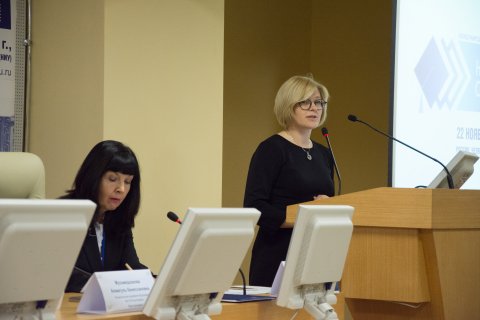On November 22nd, the Continuing Education international forum was held at South Ural State University. The event was organized by the SUSU Institute of Open and Distance Education.
This forum, dedicated to continuing education in Russia and around the world, brought together staff and researchers from universities in Russia, Kazakhstan, Czech Republic, and China.
Two events were held within this forum:
- Fifth International Conference “University of the 21st Century in the System of Continuing Education”, dedicated to two anniversaries: the 15th anniversary of the SUSU Institute of Open and Distance Education and the 40th anniversary of the pedagogical school of professor G.N. Serikov;
- International Conference “Continuing Education in the Interests of Sustainable Development: New Challenges. Stage 2”, which was held by the Ministry of Education and Science of the Republic of Kazakhstan.
The Chairman of the forum, SUSU Rector Aleksandr Shestakov, offered an opening speech to greet the guests of the forum.
"The Institute of Open and Distance Education is one of the most important components of the development of our university. This development is dynamic. The 1,500 educational programmes of the Institute meet the requests that come to our university. These are the requests that life demands, the industry of the Ural region demands, and we try to respond to them. Today, together with you, our partners, we will combine our competencies and achieve great results that will be useful to both sides."

The Director of the SUSU Institute of Open and Distance Education Irina Voloshina also offered a speech to greet the guests and spoke about the unique features of the programmes offered in the Institute.
"For 15 years, our Institute has offered programmes of professional re-training to tens of thousands of experts from enterprises of our region. The Rector noted that there are about 1,500 programmes in our Institute, and I can say that we developed each of them individually jointly with the companies: we analysed the existing competencies and strengthened training in the required fields. Therefore, each programme is innovative."
The forum was co-chaired by the Vice President of the Altynsarin National Academy of Education, Kazakhstan, Almagul Mukhamedkhanova.
"Continuing education is lifelong learning. Our academy has a monopoly in the development of educational standards and curricula, and we must meet the challenges of the 21st century. It is gratifying that people have a need for education. Together with SUSU we exchange experience and speak about the trends of scientific schools, both in Russia and Kazakhstan. Most importantly, we are close to these trends. It is important not to lose the experience gained over the years."
The forum discussed a variety of relevant topics, including intercultural communication skills for the international labour market; the relationship between multilingual education and multicultural education; continuous training for the national economy for sustainable regional development; and modern technologies of adult education. The participants raised important issues at the plenary session, as well as at the sections that took place in the afternoon.

The research advisors of the forum included: Director of the Bologna Process and Academic Mobility Centre of the Ministry of Education and Research of the Republic of Kazakhstan Almagul Kultumanova; Deputy Director of the SUSU IODE Irina Kotlyarova; and the President of the Saint Petersburg public association Continuing Education for All Nikolay Lobanov. Mr. Lobanov’s report was dedicated to the issue of postclassical education. He considered the current stage of educational development as the stage in which the centuries-old history of classical education ended. This history, in his opinion, began in the ancient Greco-Roman school, which was further developed in Russia.
“At the threshold of the fourth industrial revolution and new exclusive processes that are occurring in science, the classical system of science has exhausted its resources. I thought about what kind of marker to apply to this new system, and my decision was “postclassical education”. In the process I justified this title, and this was the main idea of my report.”
The organisations which supported the forum included: the UNESCO Institute for Lifelong Learning, Hamburg; the Council of Rectors of the Ural Federal District; the Institute for the Development of Additional Professional Education, Moscow; the Saint Petersburg State University of Economics; and the Uzbek Research Institute of Pedagogical Sciences named after Kary-Niyazi, Tashkent. The forum was also supported by the University of South Bohemia, České Budějovice; the Hebei Institute of International Business and Economics, Qinhuangdao, China; and the UNESCO-UNEVOC Centre at the Education University of Hong Kong.
More than 100 proceedings from the Continuing Education research forum will be published in the collected papers indexed in the Russian Science Citation Index.




